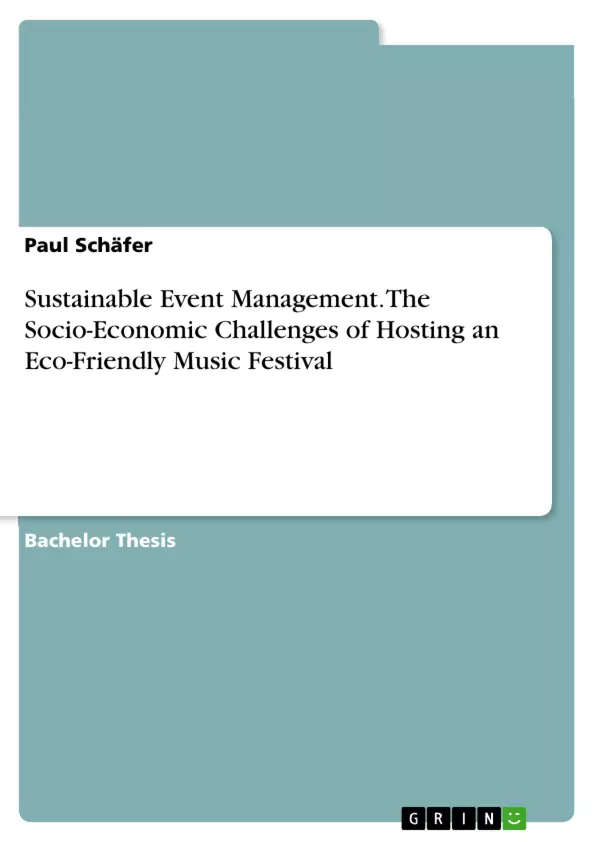This research analyses the extent to which sustainability at a festival can be managed and how desirable behaviour can be communicated and established.
With decreasing profits through record sales, artists increasingly depend on live performances and touring. As it is common knowledge that big music festivals often harm the environment, visitors expect event organizers to comply with sustainable measures. Festival managers are, however, restricted in their implementation of eco-friendly practices, as an event is dependent on the interaction of many stakeholders. Music festivals offer a unique opportunity for event managers to attempt to influence attendee’s behaviour to be more sustainable through their diversity and playfulness. By creating the appropriate framework, festival creators can shift a festival towards sustainability. To do that, they must understand their stakeholders’ values, motivators, drivers, and barriers of greening an outdoor music festival.
This paper is based on data derived from existing research and literature in the fields of event management, sustainability, sociology and behavioural research. It illustrates basic greening approaches along with the operational limits of event organizers.
Inhaltsverzeichnis (Table of Contents)
- Introduction
- Sustainability
- Definition
- Relevance of the Topic
- Focus
- Stakeholder Analysis
- Stakeholder Theory
- Concepts of Stakeholder Classification
- Internal Stakeholders
- External Stakeholders
- Stakeholders' Influence on Sustainable Development
- Measures for a Greener Festival
- Power Sources
- Diesel-Fuelled Generators
- Biodiesel and Hybrid Power Generators
- Solar and Wind Power
- Waste Management
- Waste Reduction
- Waste Management and Recycling
- Travel Emissions
- Audience Travel
- Production and On-Site Transport; Artist and Crew Travel
- Existing Regulations and Best Practice
- Power Sources
- Strategies to Reduce an Audience's Negative Impact on Sustainability
- Social Marketing
- Audience Behaviour
- Social Marketing Mix
- Consumer Value
- Manager's Drivers and Barriers towards Greening: The Mair & Jago Model
- Communicating Sustainable Objectives
- Incentives and Rewards
- Penalties
- Increasing Awareness through Information and Participation
- Social Marketing
Zielsetzung und Themenschwerpunkte (Objectives and Key Themes)
This paper explores the socio-economic challenges of hosting an eco-friendly music festival. It examines the role of stakeholders in achieving sustainability, analyzes the various greening measures that can be implemented, and investigates strategies to influence attendee behavior towards sustainability.
- The role of stakeholders in sustainable event management
- The impact of festival activities on the environment
- Strategies to reduce the environmental footprint of music festivals
- The effectiveness of social marketing and consumer value in promoting sustainable practices
- The challenges and opportunities of communicating sustainable objectives to festival attendees
Zusammenfassung der Kapitel (Chapter Summaries)
The first chapter introduces the topic of sustainable event management and the challenges of hosting an eco-friendly music festival. It outlines the importance of stakeholder involvement and the need to understand their values and motivators.
Chapter two delves into the concept of sustainability, defining its key aspects and highlighting its relevance in the context of music festivals. It also discusses the importance of considering the environmental, economic, and social dimensions of sustainability.
Chapter three focuses on stakeholder analysis, exploring different stakeholder theories and classifications. It identifies and categorizes both internal and external stakeholders, analyzing their influence on sustainable development within the music festival context.
Chapter four outlines various measures that can contribute to a greener festival. These include strategies for reducing energy consumption through alternative power sources, implementing effective waste management systems, and mitigating travel emissions.
Chapter five explores strategies for influencing audience behavior towards sustainability. It examines the potential of social marketing, emphasizing the importance of understanding audience behavior and using appropriate marketing techniques to promote sustainable practices. The chapter also discusses the role of consumer value in motivating sustainable choices and explores the drivers and barriers to greening from a manager's perspective.
Schlüsselwörter (Keywords)
Sustainable event management, music festival, stakeholder analysis, environmental impact, waste management, travel emissions, social marketing, consumer value, greening strategies.
Frequently Asked Questions
What are the main environmental impacts of music festivals?
Major impacts include waste generation, travel emissions (audience and artists), and high energy consumption from diesel generators.
How can festival organizers manage waste effectively?
Strategies include waste reduction at the source, implementing recycling systems, and encouraging sustainable attendee behavior.
What is the role of stakeholders in sustainable event management?
Organizers depend on the interaction of many stakeholders (suppliers, artists, attendees) whose values and motivators drive or barrier greening efforts.
What is Social Marketing in the context of festivals?
It is a strategy to influence attendee behavior towards sustainability through information, participation, incentives, and rewards.
Are there alternative power sources for outdoor events?
Yes, organizers can use biodiesel, hybrid power generators, or renewable sources like solar and wind power to reduce carbon footprints.
- Arbeit zitieren
- Paul Schäfer (Autor:in), 2020, Sustainable Event Management. The Socio-Economic Challenges of Hosting an Eco-Friendly Music Festival, München, GRIN Verlag, https://www.grin.com/document/915606



